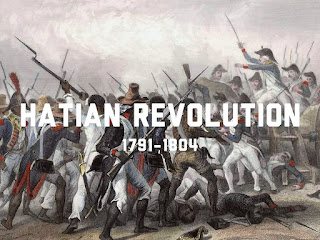Jenine
Elkady
Comparative
Literature 60AC
Tara
Philips
November
30th 2016
The Haitian Revolution
Haiti is mentioned in several of the
novels we have read over the course of the semester. Understanding Haiti’s
history especially the Haitian revolution that was unique gives insight as to
why the authors of the novels chose to include the small island or its people
it in their novels. Haiti’s was a French colony called St, Domingue it was an
important colony because the exploitation of slave labor, who made up most of
the population, allowed for them to profit off of the production of sugar,
coffee, indigo, and cotton (Southerland). The largest group of people living Haiti were
slaves most of them African born, then there were free black people, wealthy
plantation owners and the petit blanks who were the poor white people.(Smith) Followed
by the French and American revolutions Haiti followed suit with a series of
revolutions that not only freed the island from French control but also freed
its people from slavery. While all groups of people living in St. Dominigue
were either upset by French rule or by slavery the slaves acted first. In 1791
Toussaint l’Overture, a former slave, led the slave revolt, which until today
is considered the only successful slave revolt in the western hemisphere(Southerland).
However, it was not a revolution that occurred overnight with tens of thousands
of deaths and spanning years because as this happened at the same time as the
French Revolution, when Napoleon came to power he sent French troops to Haiti
in order to restore both slavery and French rule however they tenaciously
succeeded to overcome the French once again.
Haiti becomes the second
self-governed nation in the Americans after the United States not only that but
with its self-government, it also abolished slavery and with it any system of
inequality. Its citizens were radically equal to one another and Haiti became
the first Black Republic in the world (US Dept of State). So, while Haiti today might be thought
of as a poor, black, country it actually signifies a lot more than that.
Especially in Nela Larson’s novel Passing
the small country is only mentioned once, in an offhand comment about
something Brian had picked up from Haiti. However, to a people who are
pretending to be people they are not in order to drink tea at a hotel or live a
slightly better life the reminder that there is a black republic where black
people have institutional power and are equal to whites. In Absolom Absolom Haiti is perhaps seen as an insight of what will happen, as the charachter who seem's to be the only one to survive in the story in the novel Jim Bond is of haitian decent and Shreve insists that the Jim Bond's will be all over the country indicating that the events in Haiti had a severe impact on those within the novel.
https://www.youtube.com/watch?v=5A_o-nU5s2U
Works Cited
"Milestones: 1784–1800 - Office of the Historian." U.S. Department of State. U.S. Department of State, n.d. Web. 30 Nov. 2016.
Smith, Review By Ashley. "The Black Jacobins." The Black Jacobins | International Socialist Review. N.p., n.d. Web. 30 Nov. 2016.
Southerland, Claudia E. "Haitian Revolution (1791-1804) | The Black Past: Remembered and Reclaimed." Haitian Revolution (1791-1804) | The Black Past: Remembered and Reclaimed. N.p., n.d. Web. 30 Nov. 2016.

Your post is so interesting because you highlight the importance of Haiti in the Modernist novels we have read, and these reference to Haiti, though subtle, carry much weight when analyzed deeper. It is surprising that not much time in history class is spent on Haitian history despite its revolutionary way of life with respect to race. Because of your post, I now see the significance of Haiti to Modernist authors and I wish to learn more about their history.
ReplyDeleteThis comment has been removed by the author.
ReplyDeleteYour post was great and informative as it painted a nice history of Haiti and how it gained independence. I liked how you related "Absalom Absalom" to Haiti and how you mentioned Shreve's comments about Jim Bonds' being all over in the country. That was great insight and a good point added to your presentation. This post really opened my eyes about the rich history of Haiti and how Haiti was influential in modernist texts we read in class.
ReplyDeleteI wonder if voodoo and the supernatural played an important part of Haitian culture and possibly the revolution? It could be interesting to see if this would create an additional fear for US Southern plantation owners.
ReplyDelete